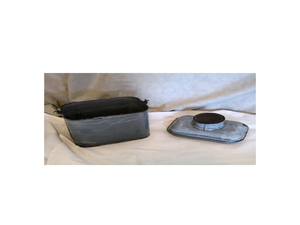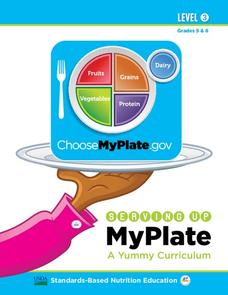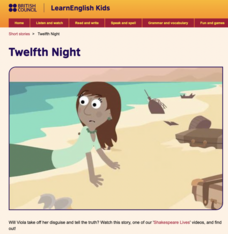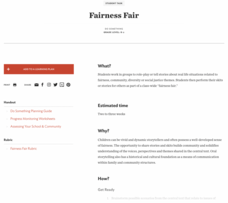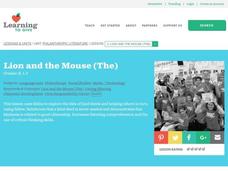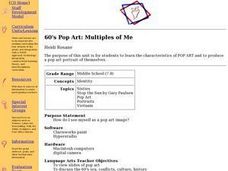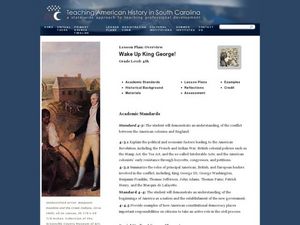Curated OER
Getting the Meaning in Pop Music
Critical thinkers compare the impact of visual versus aural perception in how they comprehend artistic intent. They consider the meaning of a set of pop lyrics first by reading them, then by listening to them orally, and finally viewing...
Curated OER
Watch the Road Signs
What makes a good speaker? Upper elementary learners practice oral fluency by working with a partner to read nonfiction books. While reading, they practice using correct tone of voice, making eye contact, and speaking clearly.
Curated OER
Lunch Pail
Explore a 1900s lunch pail. In this oral language and 1900s history lesson, students view a photograph of an old-fashioned lunch pail. Students describe the object and make predictions about what it is and its possible uses. Students...
US Department of Agriculture
Serving Up My Plate
Within three nutrition-themed, inquiry-based learning opportunities, pupils take notice of their eating habits; delve deep into the five food groups, gain experience in planning meals, participate in a taste test, and explore ads from...
Global Oneness Project
Flamenco: A Cross-Cultural Art Form
Notes of pride and persecution, exclusion and isolation resonate in flamenco. Introduce this musical art form to your social studies or Spanish language classes with a resource that follows a young flamenco guitarist as he practices his...
British Council
Twelfth Night
Scholars experience Shakespeare's, Twelfth Night, with an engaging interactive. After watching the story, six activities extend the learning experience. Topics include characters, vocabulary, a sequence of events, comprehension, and...
Teaching Tolerance
Fairness Fair
How can we create a more fair world? Chances are, class members have some ideas! After reading a text about fairness, individuals create skits around the ideas of fairness. Extend the learning and make their presentations a...
Curated OER
Listening Positions, Please
Fourth graders practice using effective listening skills as they listen to oral poetry readings.
Curated OER
Lesson Five: Introduction to Auxiliary Verbs
If you are interested, you could try out this lesson on auxiliary verbs. Class members get the chance to discuss the difference between can and could in-depth before viewing a presentation that breaks down several auxiliary verbs. After...
Curated OER
Planets
Third graders discover facts about the planets. In this planets lesson, 3rd graders form groups, choose a plant, gather facts about that planet and create a poster with the information. Students learn "tricks" on how to remember the...
Curated OER
Wild Dog Urine
Students investigate biology by researching wild animals. For this animal extinction lesson, students research African wild dogs and discuss the impact of the environment on their survival. Students read and analyze an article titled...
Curated OER
Wetland Welfare
Students research wetlands in the United States and create visual aids for use in oral presentations that make recommendations on preserving or restoring wetland welfare.
Curated OER
The Lion and the Mouse
Students examine a story. In this good citizenship lesson, students read the story "The Lion and the Mouse" and discuss being kind and what it means to be a good citizen. Students hold a discussion about how other animal pairs could...
Curated OER
Look And Listen
Students bring their favorite thing to class as a visual aid while they describe it to their classmate. In this oral information lesson plan, students fill out a worksheet about their item that is provided.
Curated OER
60's Pop Art: Multiples of Me
Students discover characteristics of Pop Art through slides and discussion of the 60's era and produce a pop art portrait of themselves using Clarisworks paint program and Hyperstudio.
Curated OER
Human Rights Violations
Students explore how human rights are different in each part of the world. In this freedome instructional activity, students define human rights, research how human rights in one country ultimately affect other countries, and share...
Curated OER
Astronomer Research
Students discover the contributions of early astronomers and scientists. For this research skills lesson, students research electronic and print sources about Galileo Galilei, Aristarchus, Hipparchus, Claudius Ptolemy, Nicholas...
Curated OER
Using a Graphic Organizer to Critically Observe Televised News Broadcasts
Students compare two television news broadcasts. They discuss how to organize information when comparing two objects and read and discuss two books to create a Venn diagram to compare both books. After creating the diagram, they view...
Curated OER
Triangular Trade and Middle Passage Review Individual Worksheet
Eighth graders explore the key concepts within the Colonization of America, the significance of the Triangular Trade Route, the origin of slavery, and the Middle Passage. After a short discussion and review, 8th graders orally practice...
Curated OER
Tour + Workshop = DESIGN: Form Follows Function
Students design a chair with function in mind. In this design lesson plan, students design a chair out of newspaper that is strong enough to hold a "peanut ball". Students discuss how the form follows the function. This lesson plan...
Curated OER
Analyzing a Poster
Eleventh graders work in small groups to analyze a poster provided to them depicting Native Americans. They prepare a response to present to the class. They conduct a group discussion from the poster. The discussion should lead into...
Curated OER
A Body Dilemma
Young scholars explore the pros and cons of the selling of body parts in this lesson. A discussion of how personal value systems impact science and research is developed.
Curated OER
Identifying Reasons for World Trade
Students examine the advantages and disadvantages of world trade. They participate in a class discussion of international trade, read a handout about a specific country, and in small groups label a map with agricultural commodity...
Curated OER
Wake Up King George!
Fourth graders research the conflict between the American colonies and England and write about it. In this America verses England lesson plan, 4th graders read books, watch videos, and have class discussions about this time in history...




